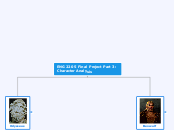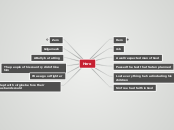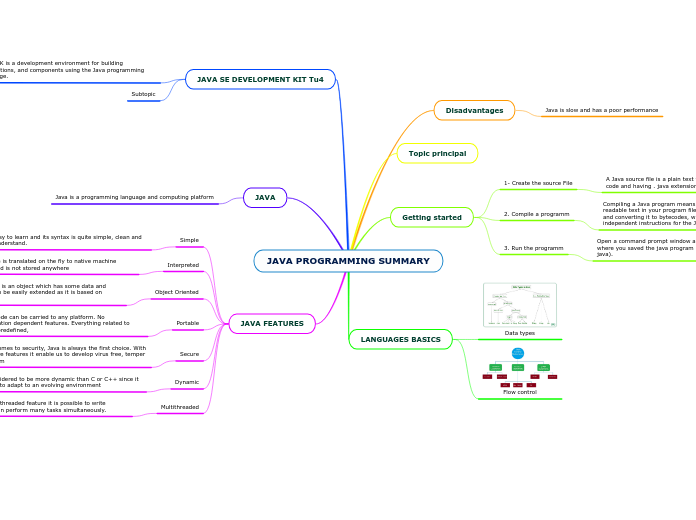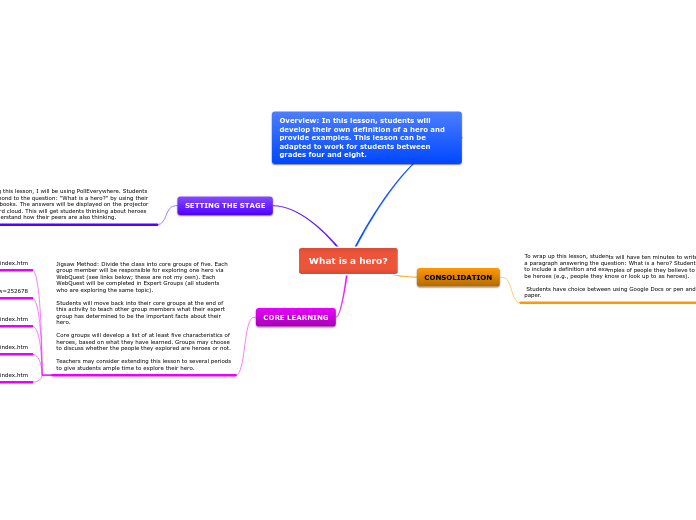ENG 2205 Final Project Part 3: Character Analysis
Beowulf
"Never a greater one on the earth have I had a sight of than is one of your number, a hero in armor; No low-ranking fellow adorned with his weapons, but launching them little, unless looks are deceiving, and striking appearance."
Not much detail is given in the text in regards to Beowulf's physical characteristics. However, a Danish soldier gives his opinion of Beowulf's appearance in the previous quote so clearly Beowulf wasn't hard on the eyes.
"So times were pleasant for the people there
until finally one, a fiend out of hell,
began to work his evil in the world" (114).
"The monster wrenched and wrestled with him
but Beowulf was mindful of his mighty strength, the wondrous gifts God had showered on him: He relied for help on the Lord of All, on His care and favour. So he overcame the foe, brought down the hell-brute" (142).
Beowulf's external conflicts abound throughout the story. Between battling the evil demon Grendel, and then the revenge stricken mother of Grendel, Beowulf has little time to catch his breath. Beowulf constantly undergoes conflict externally throughout the text.
Static
"Beowulf spoke, made a formal boast
for the last time: "I risked my life often when I was young. Now I am old, but as king of the people I shall pursue this fight for the glory of winning, if the evil one will only abandon his earth-fort and face me in the open" (168).
Beowulf even in his last moments is reveling in his past victories and boasting in his abilities. He has maintained his confidence and pride through the story and that has not wavered even in the face of Grendel or Grendel's mother.
"Nor have I seen a mightier man-at-arms on this earth than the one standing here: unless I am mistaken, he is truly noble" (118).
Beowulf is being openly endorsed as being noble and respectable. He is clearly the protagonist of this story as witnessed through this quote, and the reader can observe he is the hero of the story.
Arrogant
"When it comes to fighting, I count myself as dangerous any day as Grendel. So it won't be a cutting edge I'll wild to mow him down, easily as I might" (427).
Beowulf's arrogance radiates from his statement regarding Grendel. He believes that his fighting ability is even more advanced than the Grendel and that he doesn't need much to defeat the creature. He approaches this task with little fear, and quite a bit of self-confidence.
Determined
"I had a fixed purpose when I put to sea. AS i sat in the boat with my band of men, I meant to perform to the uttermost what your people wanted or perish in the attempt" (426).
Beowulf show cases his determination to a cause in this quote. We can note his perseverance and sincerity also as he speaks. He is willing to die if need be in order to complete the task.
Courageous
"Often for undaunted courage, fate spares the man it has not already marked" (125).
Beowulf makes this interesting statement that insinuates one can be in charge of their own fate and success if they simply act courageously. Clearly Beowulf believes this statement has some truth to it.
Odysseus
"His build is impressive enough, his thighs and his calves, his arms and stout neck. This man is strong" (Homer 415).
Odysseus is a very strong, powerful man who is physically fit and equally handsome.
External Conflict
"Nine days of bad winds blew us across the teeming sea," "he [the Cyclopes] seized two of my men and made his meal."
Odysseus battles against all types of monsters and adversity thrown his way by Poseidon and the gods. He is constantly trying to figure out a way to be victorious over the problems and perseveres in his endeavors to get home.
Dynamic
"Our lives, our mood and mind as we pass across the earth turn as the days turn…
I too seemed destined to be a man of fortune once and a wild wicked swath I cut, indulged my lust for violence staking all on my father and my brothers. Look at me now. And so, I say: let no man ever be lawless all his life, just take in peace what gifts the gods will send."
Odysseus is very prideful and arrogant in his abilities but through the course of events he is humbled and learns how to be patient and mindful because his arrogance is what got him in so much trouble to begin with. Overall, Odysseus seems to be more well rounded, and humble when he returns home and seems wiser than he was when he first departed on his journey as we can see through this quote.
Protagonist
"All the gods pitied him, except Poseidon, who stormed against the godlike hero" (Homer 332).
Odysseus is clearly the protagonist in this story because we follow his journey throughout the story, battling against Poseidon's frustrations. We triumph when Odysseus is victorious, and we hurt when he is suffering. Odysseus is clearly the hero and protagonist.
Traits
Wily
"For a beggar like me, it's better to beg for food in the town than out in the fields, and whoever wants to can give me something..These clothes I'm wearing are not so good" (Homer 526).
Odysseus lies to the people surrounding him when he returns home to Ithaca. He disguises himself as a bigger in order to conceal his identity and regain his kingdom, therefore displaying his wily side.
Prideful
"I am Odysseus, Laertes' son, known for my cunning throughout the world. And my fame reaches even to heaven" (Homer 426).
Odysseus is bragging about his title and accomplishments. He is overly zealous about his abilities.
Bravery
"Cyclops, if anyone, any mortal man, asks you how you got your eye put out, tell him that Odysseus the marauder did it, son of Laertes, whose home is on Ithaca" (Homer 437).
This quote displays Odysseus' brave because he is speaking to the Cyclops he just defeated, bragging about his victory. In order to even confront the Cyclops one would have to be brave, but Odysseus triumphs over the Cyclops after their confrontation.









